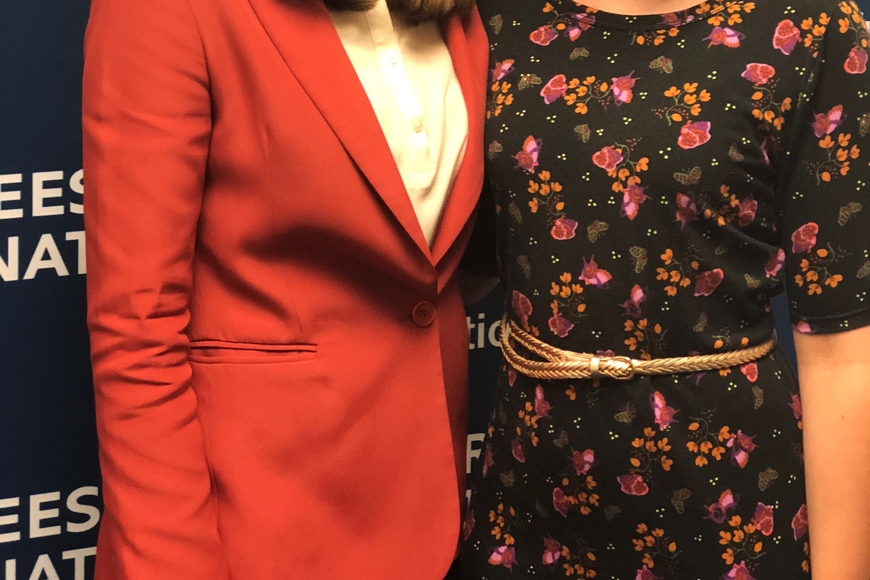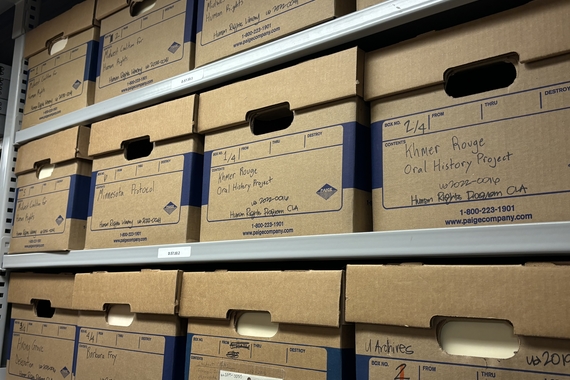Student Internship Spotlight: Julia Wilber and Hayley Drozdowski
Julia Wilber is a second year dual degree student pursuing masters degrees in Social Work and Public Policy. She is also completing a graduate minor in Human Rights. Funded in part by a fellowship from the Human Rights Program, Julia interned at Refugees International in Washington D.C. as a Programs Intern.
Hayley Drozdowski is a second year Master of Human Rights student concentrating on forced migration and trauma. Along with Julia, Hayley also worked as a Programs Intern at Refugees International in Washington D.C. She also worked remotely as a Mental Health Research Intern for the International Rescue Committee. Her internships were also generously funded by a fellowship from the Human Rights Program.
Human Rights Program (HRP): Tell us about where you interned this summer and what you worked on while you were there.
Julia Wilber (JW): I interned at Refugees International (RI), a high-level advocacy organization hoping to be a "powerful voice for lifesaving action." I was given substantive work researching and distilling important events in Washington, D.C. and globally that shaped the lives of refugees. I had a variety of projects that allowed me to understand the inner workings of RI as well as engage on a deeper level with ongoing crises. I supported an emergency mission to the U.S. Southwest border, worked on internal strategy documents, and, throughout the summer, researched and wrote on the Rohingya Crisis, culminating in a published blog.
Hayley Drozdowski (HD): Like Julia, I interned at Refugees International (RI) this summer as a Programs Intern. The position offered many opportunities to engage with a variety of refugee protection issues and to learn from a number of accomplished advocates and policy influencers. We both were lucky to work closely with the Humphrey School’s former dean and RI’s current President, Eric Schwartz, and to learn from his wealth of experience in governmental, academic, and advocacy roles. I too worked supporting the emergency mission to the U.S. Southwest border, and (along with Julia) contributed to the contextual research and writing for the subsequent mission report. Otherwise, my work focused mainly on keeping abreast of the ever changing situation at the U.S.-Mexico border, investigating and authoring a policy brief on viable alternatives to immigration detention, and supporting research and advocacy work on refugee livelihoods in Jordan. I also worked remotely as a part time research intern for the International Rescue Committee’s (IRC) Mental Health Division. In this role, I researched and authored literature reviews on providing group therapy for torture survivors and psychosocial support best practices for multicultural therapy groups. This research will support the IRC's resettlement offices around the country to improve current psychosocial support programs (or implement new ones) that are rooted in evidence-based best practices. I am continuing to partner with the IRC to co-author a comprehensive scoping literature review on social support programs that have been evaluated for efficacy to inform future IRC programming.
HRP: What were a few major takeaways or lessons that you learned this summer during your internship? Anything particularly surprising?
JW: Writing - serious, clear, measured writing - is absolutely essential to succeeding in this field. It will be my first priority as I move forward in school. While the importance of writing has been reiterated, my work this summer taught me what a good system for creating strong writing looks like - solid ideation, drafting, redrafting, having editors ask for more and more clarity, being absolutely clear about a through-line in the work, and sticking to topic sentences.
HD: Understanding exactly what “high level advocacy” means and how it works in the day-to-day was a key takeaway for me. It became increasingly clear throughout my internship at RI how different grassroots advocacy and high level advocacy are, and how high level advocacy often requires a unique set of knowledge and skills that I was unaware of before. For high level advocacy work, it’s critical that you are able to build a network of trusted contacts that link you to key interlocutors on your advocacy issue. Concise communication, integrity, and discretion are all important in cultivating relationships with policymakers, international actors, and other advocates. Furthermore, at IRC, I developed a better understanding of the many types of mental health and psychosocial interventions for trauma survivors that exist, as well as how difficult it is to assess their efficacy in the short and long term.
HRP: How was the internship related to your course of study, and how do you think it will help you in your career?
JW: This internship provided me with an incredible opportunity to define my career goals and learn essential skills in this field. Daily, I practiced skills in quick research and writing, forcing me to hone my understanding of important details. Almost weekly, I met with leaders in the field, saw their perspectives and experience in action, and asked them questions that grew my knowledge. I have a much stronger understanding of the federal policy environment that shapes refugee work in the US, which helps me better evaluate current events. I also gained a clearer understanding of the roles within the global and domestic system of refugee support.
HD: Because I was able to engage in substantive projects daily on a wide swath of refugee-related human rights issues, I gained a more holistic understanding of the international refugee protection regime, the key advocacy debates taking place on these issues, and the current challenges advocacy and resettlement organizations are coming up against. These lessons will certainly inform how I conduct my research in classes throughout this year, as well as areas of interest I will pursue in my future career.



